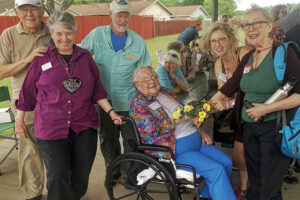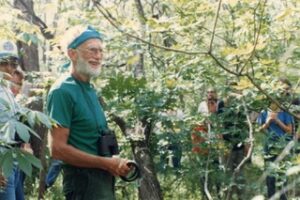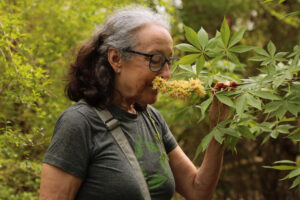By Amy Martin
Winnow, verb, To blow a current of air through grain to remove the chaff. Similar: Separate, divide, sort out, or remove things from a group until only the best ones are left.
Ned’s heyday was the 1960s to ’80s. For most of that time, there was no internet. All the astounding things Ned accomplished, he did with letters and press releases, each one loving typed from his hen-scratch handwriting by his wife, Genie. He wrote everyone, even presidents!


There are 71 boxes of material in the Edward C. Fritz archives at SMU’s DeGoyler Library, the inner sanctum of the vast Fondren Library. Each box is approximately two feet long and crammed full of folders. That makes 142 linear feet of material.
Those press releases, letters, and many of the replies, are in these boxes. There are voluminous clippings of newspaper and magazine articles about Ned and his colleagues, and printed material ranging from articles in small-town newspapers to scientific periodicals — all covering his vast array of interests.
And Ned’s writings! In the ’50s and ’60s he penned articles about the family’s epic travels, often to see Genie’s kin and colleagues in Latin America. It was a welcome escape from the intense stress of being a trial lawyer fighting finance-industry usury, especially against people of color.


Ned articulated in talks, articles, and position papers over and again, in patient detail, the immense damages commercial forestry was waging in the national forests. He explained the ecology of riparian corridors, stormwater, and erosion. He instructed how laws in defense of wildlife were for naught if habitat were not saved.
But most telling, most insightful, were his writings in the last ten years of his life, during his 80s. Though often consulted for advice, he was fully retired, his mind a bit fuzzy, health ailments a daily dilemma. He opened up emotionally, speaking from the heart, writing mostly for himself, not intent on publication as before. It is an honor to read these.

And so I winnow, aided by Steven Ploch, who gives detailed reads to material and comes up with surprising insight. As we do, Ned unfolds like a blooming rose, layers upon layers of meaning and vision. Steven discovered Ned worked with The Nature Conservancy to facilitate purchases of cloud forests and other precious ecosystems in Mexico and Central America, even exchanging letters with presidents. Where is that going to go? New material emerges and so the book outline must adapt.
We’ve got weeks ahead in these archives. Ned crammed as much into his one life as would take more than a dozen ordinary men. Both of us dive down many a rabbit hole after something utterly fascinating, only to surface and ask the perennial question: Does this belong in the bio?
As I plow through archive files, I find those threads where interests became action, tugging that thread to find its beginning and following through to its end. Conceptual threads accumulate on the archive tableau. From that, I weave the story of a man.





